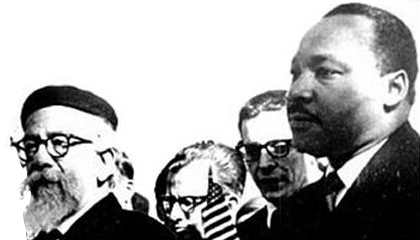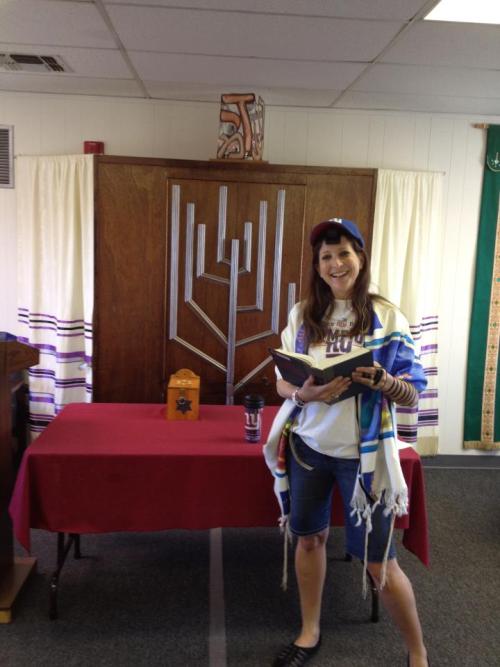| ||||||||||||||
| |
Shefa's Rabbi Blog List
Tuesday, January 31, 2012
Masorti Foundation: History Made at the Knesset
News from Masorti UK! New Jewish Primary School Finchley!
![]()
|
Wednesday, January 25, 2012
jpost.com: "First mixed prayer service in Knesset"



First mixed prayer service in Knesset
By JEREMY SHARON
25/01/2012
http://www.jpost.com/JewishWorld/JewishNews/Article.aspx?id=255117
A historic prayer service was conducted in the Knesset on Wednesday by a leadership mission of the Masorti-Conservative movement from North America who held the first ever mixed men and women service in the Knesset.
The group, including male and female rabbis and communal leaders from the US and Canada, met with several MKs to discuss the issue of religion and state, including Ministers Dan Meridor and Uzi Landau, as well as Yohanan Plesner and Orit Zuaretz.
The meetings focused for the most part on the issue of religious radicalization in Israel and its influence on the country's image abroad, particularly in America.
As has been the norm for the group during the visit, they went to say the afternoon mincha prayers when their schedule of political engagements was over, and, as is the custom in the conservative streams of Judaism, men and women sat together without a partition.
The service was led by Rabbi Jen Gorman in the Knesset synagogue in what the group described as an historical first.
"It was an inspiring service and we were extremely happy to be praying in the beautiful synagogue of the parliament of the Jewish State," said Rabbi Dr. Alan Silverstein, president of the Masorti foundation in the US. "Each Shabbat we pray in communities of Conservative Judaism worldwide, for the well-being of the State of Israel, and here we had the opportunity got to do this great mitzvah in the synagogue of the Israeli Knesset of Israel, one of the most important symbols of Jewish sovereignty."
The group also raised the controversial issue of rights for non-Orthodox streams of Judaism, referring to the lack of recognition the state grants the Conservative movement's rabbis and ceremonies.
"All of us love Israel and support Israel and members of our communities are part of the central leadership of AIPAC, Hadassah and the Jewish Federations," said David Lisi, the director of the Masorti Fund in the US. "But the State of Israel degrades us time and again when it says that we are second-class Jews," he continued mentioning conservative marriages and converts in particular. "The discrimination against non-Orthodox movements in Israel does massive damage to the image of Israel as a state for all Jews," Lisi asserted.
The director of the ITIM religious rights group and orthodox rabbi, Seth Farber, told The Jerusalem Post that the state of Israel finds itself at a cross roads in this regard and that as the relationship with the Diaspora matures "some very difficult decisions lie ahead."
"A lot of work still needs to be done to make Jews of all denominations feel comfortable in Israel," he said.
"There isn't enough strategic thinking going on to think about how Israel can be a homeland for all Jews. The state wasn't founded to be insular and indifferent to Jewish people and so there needs to begin a sincere dialogue with Diaspora communities to tackle these issues."
Monday, January 23, 2012
Rabbi Andrew Sacks on Jpost: "Haagen Dazs - The Great Kashrut Controversy"
http://blogs.jpost.com/content/we-all-scream-ice-cream

Rabbi Andrew Sacks is the Director of the Masorti [Conservative] Movement's Rabbinical Assembly in Israel (the organization of Masorti/Conservative rabbis) and the Masorti Movement's Bureau of Religious Affairs. The views expressed are his own and do not necessarily reflect those of Masorti organizations.
Monday Jan 23, 2012
We all scream for ice cream
Haagen-Dazs is NOT Kosher. Ouch! The Chief Rabbinate of Israel, who under Israeli law has sole authority for matters relating to Kashrut in Israel (despite the plethora of Badazim) has ordered the product removed from the store shelves. They have gone so far as to say that "those refusing to comply risk losing their Kashrut certification." This abderian behavior, sad or funny though it may be, is becoming a trend.
Did someone discover lard in the ice cream? Is General Mills (the owner of Hagen-Dazs) spiking the product with pigs milk? The answers are no and no. The same ice cream that has been deemed Kosher until now has suddenly become suspect.
The problem, according to the spokesperson for the Rabbinate, is that Haagen-Dazs uses real milk rather than milk powder. If the milk is produced by non-Jews (Halav Akum), then they fear that it may become contaminated with a mix of milk from non-Kosher animals. For various reasons that defy logic this suspicion does not apply to powdered milk.
So the OU certification (the largest corporate Kashrut certification in the world) is good enough for North America but it falls short of the demands of Israel's zealously pious Orthodox Chief Rabbinate.
Well, one might simply say "different strokes for different folks." I have a friend who is an Orthodox rabbi here in Israel. His family keeps a vegetarian home. Yet, his brother-in-law won't eat in his home because he allows the use of dairy products that are under the supervision of this same Rabbinate that bars Haagen-Dazs. Maybe all dairy products should be pulled from store shelves?
Sound like the Chief Rabbinate has gone over the top? Sound silly? Well it is not. This is part of an ugly effort by Israel's Chief Rabbinate to become the equivalent of a papacy by setting religious standards for all communities, both in Israel and abroad.
It was just a few years back that this same righteous Chief Rabbinate decided that they would no longer recognize as Jewish those who convert via the rabbis who are members of the RCA (Rabbinic Council of America). They limited to a very small number the rabbis and rabbinical courts they would accept. The RCA and the OU are part of the same movement structure. The conversions performed by Orthodox rabbinic graduates of Chovevei Torah have been rejected almost outright.
Local rabbinic courts have always been autonomous. They must take into account local circumstances. Indeed, it is the oppressively strict standards used by the Chief Rabbinate of today (this was not so when Ben Zion Uziel or Ovadya Yosef served as Chief Rabbis) that has contributed to a strong public distaste for the religious establishment in Israel.
The Pope may set the standard for all priests in the Catholic faith tradition but we do not have a Pope. Even the concept of a Chief Rabbis does not come from within the Jewish tradition. It was established by the British based on the Millet system of the Ottomans.
This power grab by the rabbinate is little more than a veiled attempt at obtaining greater power. They have made this effort with regard to conversion, Aliyah, family status matters, military issues, and now ICE CREAM.
I don't know how other observant Israelis will take this but I, for one, will continue to enjoy my White Chocolate Raspberry Truffle Hagen Dazs.
You scream, I scream, let's all scream for our ice cream.
Sunday, January 22, 2012
Friday, January 20, 2012
Rabbi Dov Linzer in the NYtimes: "Ultra-Orthodox Jews and the Modesty Fight"
NYtimes.com: "Ultra-Orthodox Jews and the Modesty Fight"
Lechery, Immodesty and the Talmud
By RABBI DOV LINZER
Published: January 19, 2012
IS it possible for a religious demand for modesty to be about anything other than men controlling women's bodies? From recent events in Israel, it would certainly seem that it is not.
Jennifer Uman
Related News
Israelis Facing a Seismic Rift Over Role of Women (January 15, 2012)
-
Israeli Girl, 8, at Center of Tension Over Religious Extremism (December 28, 2011)
Last month, an innocent, modestly dressed 8-year-old girl, Naama Margolese, living in Beit Shemesh, described being spat on and vilified by religious extremists — all men — who believed that she did not dress modestly enough while walking past them to the religious school she attends. And more and more, public buses in Israel are enforcing gender segregation imposed by ultra-Orthodox riders in and near their neighborhoods. Woe to the girl or woman who refuses to move to the back of the bus.
This is part of a larger battle being waged in Israel between the ultra-Orthodox and the rest of Israeli society over women's place in society, over their very right to have a visible presence and to participate in the public sphere.
What is behind these deeply disturbing events? We are told that they arise from a religious concern about modesty, that women must be covered and sequestered so that men do not have improper sexual thoughts. It seems, then, that a religious tenet that begins with men's sexual thoughts ends with men controlling women's bodies.
This is not a problem unique to Judaism. But the Talmud, the basis for Jewish law, offers a perhaps surprising answer: It places the responsibility for controlling men's licentious thoughts about women squarely on the men.
Put more plainly, the Talmud says: It's your problem, sir; not hers.
The ultra-Orthodox men in Israel who are exerting control over women claim that they are honoring women. In effect they are saying: We do not treat women as sex objects as you in Western society do. Our women are about more than their bodies, and that is why their bodies must be fully covered.
In fact, though, their actions objectify and hyper-sexualize women. Think about it: By saying that all women must hide their bodies, they are saying that every woman is an object who can stir a man's sexual thoughts. Thus, every woman who passes their field of vision is sized up on the basis of how much of her body is covered. She is not seen as a complete person, only as a potential inducement to sin.
Of course, once you judge a female human being only through a man's sexualized imagination, you can turn even a modest 8-year-old girl into a seductress and a prostitute.
At heart, we are talking about a blame-the-victim mentality. It shifts the responsibility of managing a man's sexual urges from himself to every woman he may or may not encounter. It is a cousin to the mentality behind the claim, "She was asking for it."
So the responsibility is now on the women. To protect men from their sexual thoughts, women must remove their femininity from their public presence, ridding themselves of even the smallest evidence of their own sexuality.
All of this is done in the name of the Torah and Jewish law.
But it's actually a complete perversion. The Talmud, the foundation of Jewish law, acknowledges that men can be sexually aroused by women and is indeed concerned with sexual thoughts and activity outside of marriage. But it does not tell women that men's sexual urges are their responsibility. Rather, both the Talmud and the later codes of Jewish law make that demand of men.
It is forbidden for a man to gaze sexually at a woman, whether beautiful or ugly, married or unmarried, says the Talmud. Later Talmudic rabbis extended this ban even to "her smallest finger" and "her brightly colored clothing — even if they are drying on the wall."
To make these the woman's responsibility is to demand that Jewish women cover their hands, and that they not dry their clothes in public. No one has ever said this. At least not yet.
The Talmud tells the religious man, in effect: If you have a problem, you deal with it. It is the male gaze — the way men look at women — that needs to be desexualized, not women in public. The power to make sure men don't see women as objects of sexual gratification lies within men's — and only men's — control.
Jewish tradition teaches men and women alike that they should be modest in their dress. But modesty is not defined by, or even primarily about, how much of one's body is covered. It is about comportment and behavior. It is about recognizing that one need not be the center of attention. It is about embodying the prophet Micah's call for modesty: learning "to walk humbly with your God."
Eight-year-old Naama could teach her attackers a thing or two about modesty.
Dov Linzer, an Orthodox rabbi, is the dean of Yeshivat Chovevei Torah Rabbinical Schoolin the Riverdale section of the Bronx.
Monday, January 9, 2012
Rabbi Bradley Shavit Artson: "Biblical Economic Justice: Supply and Demand Isn't Enough"
As the voters of the United States recommence the process of electing the next President, it is important to recall our core values. Liberals and conservatives, Democrats and Republicans may legitimately differ on how best to implement those values, but clarifying what values remain our bedrock is the first step toward assuring that these policy disputes remain constructive. One of those bedrock values is, in the words of the Declaration of Independence, "providing for the general welfare." In biblical terms it is "loving your neighbor as yourself."
During my second year in college, I decided to take the introductory course in economics. After all, learning how we allocate resources, create products, and encourage creativity and productivity all seemed like important tools for being an informed citizen. The Intro to Economics course was wildly popular, offered not in a classroom but a university theater in order to accommodate the standing-room-only numbers of students who enrolled. This class, clearly, held the keys not only to information, but to influence and power.
At the first lecture, the professor taught us about supply and demand, an economic model for determining the price of a good in the market. Equilibrium (the price charged for a product) rests at the intersection of Supply provided by producers (at a particular price) with the quantity of Demand (at a particular price) by consumers. When those two meet at a single point, their market equilibrium is found. That price marks the most efficient level for the production and distribution of a product.
Note that "demand" here does not equate to human need, but to the ability (and willingness) to pay for a product. No money -- no demand.
"Wait a minute," I objected. "You mean that if someone is starving on the street, penniless, then according to this model they have no demand to measure?" Right, I was told. Demand measures ability and willingness to pay, not need. You can starve to death with no measurable "demand," no impact on the market whatsoever.
At that moment, I realized that market economics measures efficient production and distribution of resources, but nothing more. Like Darwinian evolution, it possesses no moral compass; it simply describes what is, not what ought to be. And -- again like Darwinian evolution -- its mechanism doesn't integrate values such as compassion, minimizing suffering, protecting the weak, expressing a commitment to love or justice. Supply and demand measures efficiency -- an important concern to be sure, but by itself, incomplete. Just as our society makes decisions that integrate values other than Darwinian survival (we are committed to foster the flourishing of the individual, to intervene to heal the sick, to educate and empower the disabled and the underprivileged), so too our economic priorities must integrate but cannot be limited to market efficiency. There are other important values we also must advance. Supply and demand, by itself, does not evaluate when there might be concerns that override efficiency in particular cases -- feeding impoverished school children, for instance, making sure that indigent elderly have shelter, providing inoculations where needed, internalizing the cost of industrial waste dumped into our air and seas.
Such a commitment to human flourishing even at the occasional expense of efficiency is as consensual as our founding fathers and as sacred as Scripture: It was Thomas Jefferson, after all, who reminds us that "we hold these truths to be self-evident: that all men are created equal, that they are endowed by their Creator with certain inalienable rights; that among these rights are life, liberty and the pursuit of happiness." God-given concern for life, liberty and happiness are the proper goals of American democracy. Market efficiency is often a tool that advances those goals, but the goals are more encompassing than efficiency and sometimes require us to modify our commitment to the free market in support of more ultimate goals.
The Bible itself provides ample examples of laws that modify the unbridled rights of property owners: we are commanded to leave the corners of our fields unharvested, and to harvest our crops but once. Any remaining produce becomes the property of the poor, and they are legally entitled to access to that yield. Mandatory funds are established so the poor can sustain themselves, and the rich were obligated to provide food, clothing and sustenance for the widow, the orphan and the poor. Ancient Israel provided community education for all (male) children. One legal standard applied to rich and poor alike, with all contributing their fair share in tax revenue. Fields are to lie fallow every seventh (Sabbatical) and 50th (Jubilee) years to renew their bounty. While the market forces of supply and demand were the baseline for ancient Israel's economic activity, both Bible and Talmud delineate a prohibition of excessive profits, which were held to be sinful and impermissible.
Biblical Israel aspired to attain a vision in which all people were recognized as reflections of God's image -- each person of equal worth and dignity. That theological commitment, as it does in the USA's Declaration of Independence and in the world's Scriptures, mandates concern for the individual that sometimes supersedes the mechanism of market efficiency.
Democrats and Republicans, conservatives and liberals should legitimately dispute which policies best advance that bedrock commitment. Such debates can help the nation better understand the challenges ahead and how most effectively to address them. But the underlying commitment must remain bipartisan supreme.
An economy that ignores supply and demand may find itself lacking the resources to sustain itself. We properly work with market economics as the starting point for our economic activity.
But an extremism that elevates supply and demand to its solitary and highest priority rejects a more encompassing Biblical commitment to care for the widow and the orphan, to provide food and clothing for the poor, to educate and nurture all its children, to live harmoniously with creation. Such a idolatrous dogmatism must be rejected, both in the name of our Founding Fathers and in the name of the world's wisdom traditions.
Thursday, January 5, 2012
Rabbinical Assembly: "A Prayer in Honor of Martin Luther King Day"
By Rabbi Lilly Kaufman

Dr. King would have faced hard facts today.
He would know the number of children
going hungry in America this very minute.
He would know the number of our war dead,
and those wounded in new ways.
He would know the astounding costs
of financial corruption.
He would have seen beyond the numbers,
to the faces of our people,
and he would still have faith in them,
and in what is right.
He would be preaching now
a determined, measured, poetic, prophetic outrage.
He would be teaching by example
our civic duty of compassion,
and decrying the grave civic danger of cynicism.
He would challenge the strange new ideas
that money equals speech
and corporations are people
in a democracy.
When he gave his life for peoplesʼ rights
of speech, and assembly, and the vote,
it was for people
who had no money to pay for speech.
They knew speech as an unalienable right,
and their wealth of spirit sufficed.
Dr. King had faith in a few great things:
one was our essential American dream.
Not a middle-class American dream,
or an upper-class, a working-poor,
or an impoverished-class American dream.
But the defining American dream
which lifts up those bowed down.
The abiding American dream
of liberty and justice for all.
Dr. King asked of God in 1964:
... grant that we will always reach outfor that which is high,realizing that we are made for the stars,created for the everlasting,born for eternity.
May we learn again to reach out for that which is high.
Amen.












